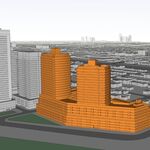M II A II R II K
Senior Member
Transit Secrets: Learning From Hong Kong
August 5, 2011
By Alex Marshall
Read More: http://citiwire.net/post/2871/
There is really no denying that transportation makes money. Just consider the huge shopping malls perched around interstate off-ramps, the office parks positioned close to airports, the skyscrapers next to subway stations. But transportation itself is usually a money loser. We pour billions of public dollars into highways, airports and transit systems, while others, the home builders, the department store mavens, make the money that comes slows from those public investments. Hong Kong’s metro system, MTR, has changed this equation, and that is why it’s worth looking at.
- The answer is that Hong Kong’s MTR doesn’t let private developers be the only ones that perch next to its stations. It builds its homes, offices and stores. In short, MTR acts as a real estate developer and business company, as well as a train operator. It owns, among other things, 12 shopping malls built around its stations. These properties and businesses produce substantial cash, which keep the transit agency as a whole in the black.
- Hong Kong’s MTR is unusual in also actually making money from its fares as well. How it can do this relates in part the uniqueness of running trains on an intense few strips of land filled with development. But for our purposes it’s worth looking at its actions as a developer, and that as a model for transportation agencies and departments in this country.
- By many standards, MTR is an unusual company. The MTR only began service in 1979. But once cash was flowing (through development around stations), the government “graduated†MTR to become a private company, still majority owned by government, so that it could raise funding through capital markets and more nimbly enter into joint ventures with private investors.
- Could transit and highway departments in the United States ever do something equally innovative? Why shouldn’t a highway department make money on the shopping malls built around its exits? Shouldn’t it at least get a cut? While it may seem extraordinary to have a transit company operating like a profit-making company, it’s not novel. A century ago private streetcar lines made money more on the homes and shops built around their tracks, on company-owned land, than the nickel fares they received.
- Let me be clear here. I don’t want the transit agencies or highway departments to be only concerned with making a profit for their shareholders, which is how private businesses act. I want them to make a profit for the public, so that roads can be maintained well, taxes and fares kept down.
.....
August 5, 2011
By Alex Marshall
Read More: http://citiwire.net/post/2871/
There is really no denying that transportation makes money. Just consider the huge shopping malls perched around interstate off-ramps, the office parks positioned close to airports, the skyscrapers next to subway stations. But transportation itself is usually a money loser. We pour billions of public dollars into highways, airports and transit systems, while others, the home builders, the department store mavens, make the money that comes slows from those public investments. Hong Kong’s metro system, MTR, has changed this equation, and that is why it’s worth looking at.
- The answer is that Hong Kong’s MTR doesn’t let private developers be the only ones that perch next to its stations. It builds its homes, offices and stores. In short, MTR acts as a real estate developer and business company, as well as a train operator. It owns, among other things, 12 shopping malls built around its stations. These properties and businesses produce substantial cash, which keep the transit agency as a whole in the black.
- Hong Kong’s MTR is unusual in also actually making money from its fares as well. How it can do this relates in part the uniqueness of running trains on an intense few strips of land filled with development. But for our purposes it’s worth looking at its actions as a developer, and that as a model for transportation agencies and departments in this country.
- By many standards, MTR is an unusual company. The MTR only began service in 1979. But once cash was flowing (through development around stations), the government “graduated†MTR to become a private company, still majority owned by government, so that it could raise funding through capital markets and more nimbly enter into joint ventures with private investors.
- Could transit and highway departments in the United States ever do something equally innovative? Why shouldn’t a highway department make money on the shopping malls built around its exits? Shouldn’t it at least get a cut? While it may seem extraordinary to have a transit company operating like a profit-making company, it’s not novel. A century ago private streetcar lines made money more on the homes and shops built around their tracks, on company-owned land, than the nickel fares they received.
- Let me be clear here. I don’t want the transit agencies or highway departments to be only concerned with making a profit for their shareholders, which is how private businesses act. I want them to make a profit for the public, so that roads can be maintained well, taxes and fares kept down.
.....




